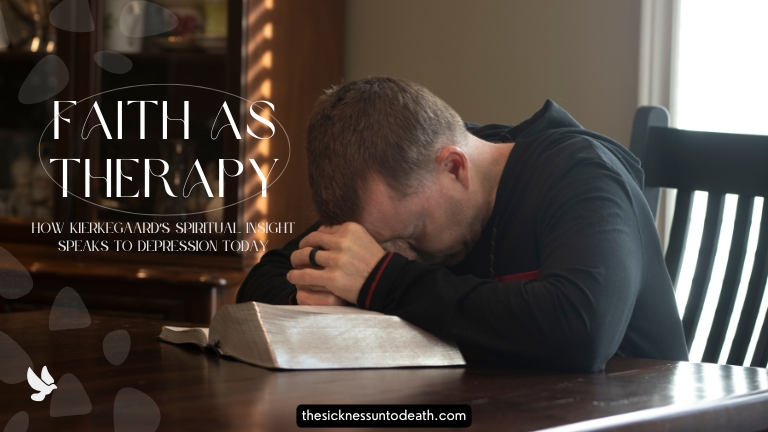Discuss how Kierkegaard’s understanding of the self and God can provide spiritual comfort for those facing depression in a secular age.
In a world where mental health is often reduced to brain chemistry and treatment plans, Søren Kierkegaard offers something different—something deeply human. Writing in 19th-century Denmark, this philosopher and Christian thinker described the kind of inner anguish we now associate with depression, long before the term existed.
But Kierkegaard didn’t label it a disorder. He called it despair—a sickness of the soul. And in doing so, he opened the door to a radically spiritual understanding of human suffering. At a time when many feel spiritually unanchored and emotionally worn down, Kierkegaard’s insights offer something surprisingly modern: faith not as dogma, but as therapy.
When the Self is in Crisis
Kierkegaard believed that our deepest struggles don’t come from external pressures alone—they arise when we become disconnected from our true self. And for him, that self is not simply a product of biology or upbringing. It is something sacred: a self that is formed in relationship with God.
“The self is a relation that relates itself to itself, and in relating itself to itself, relates itself to God.”
When we forget—or reject—this spiritual foundation, Kierkegaard says we begin to suffer. We look to success, approval, image, or productivity to give us worth. But none of these things can truly satisfy. When they fall short, what’s left is a hollow ache—a kind of inner collapse we might today call depression.
Depression in a World Without God
In our secular age, many people face depression without any spiritual framework. Therapy helps. Medication can stabilise. But there’s often something missing: a sense of meaning.
Kierkegaard understood that meaning isn’t something we invent. It’s something we receive when we accept who we truly are: beings made to live in truth before God. Without that grounding, we remain fragmented—forever searching, forever anxious.
That’s why he didn’t see despair as a medical condition to cure, but as a spiritual signal—an urgent whisper from the soul that we are not living in alignment with who we were created to be.
Faith as Spiritual Recovery
So, what does it mean to approach faith as therapy?
It doesn’t mean avoiding medical treatment. Kierkegaard isn’t anti-science. But he does suggest that no amount of cognitive reframing or emotional support can reach the deepest wounds of the human heart—those that come from spiritual disconnection.
Faith, in his view, is not wishful thinking. It’s not a blind leap into superstition. It’s the courageous act of turning back to the God who formed us—acknowledging our brokenness and receiving grace. It’s recognising that we don’t have to be enough, or fix ourselves, or pretend we’re doing fine.
In fact, Kierkegaard believed that admitting despair is the very beginning of hope.
“To be in despair is to be conscious of being in despair—and that is the beginning of healing.”
Why Kierkegaard Still Matters Today
What makes Kierkegaard’s voice so compelling today is that he doesn’t offer quick fixes or spiritual clichés. He meets us where we are—in the dark, in the questions, in the doubt. And from that place, he gently points us to a God who knows our pain.
For those living with depression in a secular world, Kierkegaard offers more than a philosophy. He offers a way back to wholeness—not by escaping suffering, but by allowing it to draw us closer to our truest self and to God.
Faith, then, becomes more than belief. It becomes therapy for the soul.
Final Thoughts
If you’re struggling with depression, Kierkegaard would not ask you to deny your pain. He would urge you to listen to it. To see it not only as a problem, but as a path. A call back to the centre. A signal that your soul longs to be known, healed, and held by something greater than yourself.
In a culture that often treats faith as outdated and therapy as purely clinical, Kierkegaard reminds us that the two may not be so different after all.
Sometimes, the deepest healing begins when we let ourselves believe we are not alone.

